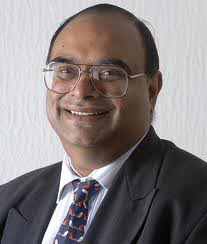
Dr. Paul Sabapathy
|
Before I came to Madras Christian College (MCC) for my university education, I was greatly privileged to study at Lawrence School, Lovedale. It is a boarding school with a military bias whose excellent headmaster in my time was K.I. Thomas, who went on to found 'Sishya' in Chennai. The school, like MCC, was set in 800 acres of forest and at 6500 feet above sea level. It was founded in 1858.
When I joined MCC, the Principal was Rev.J.R. Macphail, who taught me English. He was followed by Dr Chandran Devanesan, the first Indian to hold the post. He did this with great drive, distinction and panache.
When I joined PUC in 1958 and stayed in St Thomas's Hall, I took to college like duck to water, as I had the great advantage of coming from an excellent boarding school environment at Lovedale. I was confident and, as you can see, I am big in stature and quite capable of looking after myself, so no one dared make me go through the indignities of ragging which was common at the time. Also coming from an English medium school used to military discipline, combined with my self-confidence, was a great advantage.
St. Thomas's Hall was a friendly place with an excellent warden in Prof. M.A. Thangaraj, who went on to be Principal of American College, Madurai.
After my PUC, I did my B.Sc. Physics which was a great mistake on my part, as I did not enjoy the subject. I, however, greatly enjoyed my subsidiary subjects and was an active participant in extracurricular activities, including quiz, debating, athletics, NCC and table tennis.
However, the highlight of my time at MCC was being Prime Minister of St Thomas's Hall in 1962-63. It was a great experience which moulded me in developing leadership and teamwork skills, honed my communication and organisational skills, and focussed on excellence. Organising a Hall Day successfully takes some doing.
The night was an outstanding success. Unfortunately one of my hall-mates, a university hockey player, got drunk and started pulling the fairy lights decorating the Hall. Fearing electrocution a few of us had to restrain him and I took a cold shower with him in my suit, to get him sober, which we successfully did.
* * *
What did I learn from my time at MCC? The importance of working as a team, the ability to communicate, and lead by example, and the need to get things done. MCC greatly increased my self-confidence and self-belief. It was at MCC that I realised the importance of focussing on quality and being the best.
I also learned that to do well you had to enjoy what you did. It is a mistake made by many students and parents chasing the money and the prestige of being a doctor or an IAS Officer rather than doing what they love doing. So when I changed from Physics to Business Studies, which I enjoyed, success followed.
* * *
What is my vision for the future for MCC? My vision is that MCC will become an educational institution of excellence by providing students with the highest quality educational experience to enable each student to achieve his/her full potential, to become highly educated, responsible citizens committed to bettering themselves, their families and their fellow Indian citizens, by acting with honesty, integrity, objectivity, efficiency and in a selfless manner whilst striving to be the best themselves.
How can this be achieved? I make a few suggestions for the future:
l. By outstanding leadership from the top, with leaders chosen on merit, with no place for politics. The golden standard being selfless outstanding leaders like the Rev. Miller, Boyd and Devanesan. This in no way implies that the current Principal was not chosen on merit. The responsibility for recruiting, nurturing and retaining outstanding leaders rests with the Board.
2. By recruiting, motivating and retaining the best teachers and researchers of any creed. This will be enabled by human resource development practices which reward excellence and do not accept mediocrity.
3. Enable students to be highly sought after by employers by inculcating in them high moral and ethical values combined with developing their intellectual, communication, teamwork, leadership and enquiry skills with an ability and work ethic to apply their theoretical knowledge to solving practical problems.
4. Use new technology to make best use of student and lecturer contact time to explain rather than dictating notes.
5. Run the college on business principles of efficiency, effectiveness, and investing to save, so surpluses can be generated to invest in improving equipment or buildings to improve student experience.
6. Know which courses cover their cost, so efficiencies can be made.
7. Ensure all lecturers have a teaching qualification.
8. Explore introducing subjects like Finance, Law, Banking, Pharmacy and Pharmacology which have links with existing subjects like Commerce and Chemistry.
9. Improve student employability by considering teaching subjects like Mandarin, Portuguese, and presentational skills. Also set up an Advisory Management Board for each subject with outside experts and employers who can advise on how students can meet employers' needs.
In all this I am talking with 17 years' experience in higher education in the UK, including seven years as Chairman of Birmingham City University which has 23,000 students.
|

